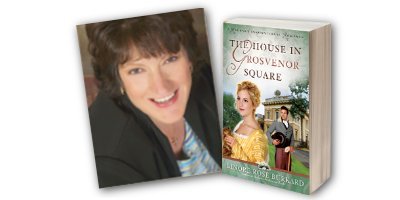AN INTERVIEW WITH LINORE ROSE BURKARD

Linore Rose Burkard stops by to chat with me, this month, about her new book, The House In Grosvenor Square, the sequel to Before the Season Ends.
Welcome, Linore, it’s so good to have you back.
Thanks so much, Deborah, it’s a pleasure to be here again.
I’m going to start right in and ask you to share a little about The House In Grosvenor Square.
Well, as you know, this is the second book I’ve done with Harvest House, and it follows on the heels of Before the Seaon Ends. This book moves the main characters from the earlier book forward to the altar, but not before a great deal of twists and turns and mysterious happenings occur. It’s adventure and romance, suspense and humor, all threaded together, and with the distinctly early 19th century feel that the first book had.
What inspired you to add suspense to this second book, when Book 1 is strictly romance?
I suspect I have a few mysteries up my sleeve for the future, so adding a little suspense to a story is quite fun for me. I didn’t feel like I had to ‘stretch’ to do it, in other words.
Why does Ariana feel guilty for delighting in the wealth of her husband-to-be?
She knows that it wasn’t his wealth that drew her to him, or made her fall in love with him, but she is so disgusted with what she sees as a money-obsessed society, that she can’t help but feel guilty, even for perfectly natural feelings.
I’m going to switch gears, here, for a bit. Do you think there are any similarities between the Regency period and today’s society?
Oh, yes, absolutely. I’ve said this before Deborah, and it’s true: Times change, but people don’t. Regencians had the same concerns about appearance, financial security, love and acceptance, that we all have. They worried about falling ill, losing their money, getting old, losing their social standing, or, if they were lower class, they worried about having enough of the basics. Young women (in all classes) had less choices about their lives than we do, today, and so they worried about marrying well. If they failed to marry, there were very few professions they could enter, and they worried about being a burden to their parents.
What misconceptions do you believe people have about the Regency era?
That it was all one great party. Or that life was easier, then. On the other hand, some people like to think that society was a great deal more “tame” back then, when in reality, while Regency society was what we call “mannered,” it nevertheless was as treacherous as any group of people at any time in history, and perhaps even one of the most “closed” groups that has ever dominated a culture. This is particularly true of the upper class.
The information on your Web site shows that you speak on several Regency topics. One of these topics is the Regency-style tea. Will you give us a little peek at what that would look like?
I’m glad you asked <g>. Actually, I offer a free download on my website about that very thing, and it will give you an excellent idea how to hold your own “Regency” tea. All of your readers can download it instantly HERE.
Can you describe some of the food from that period?
English cooking in general has never been the most exotic in Europe; but the Regency was famous for its extravagances, and food was no exception. For the gentility and upper classes, meals were generally ample, with multiple courses, and more than one main dish per course, plus a host of “sides”, other dishes called “middles” and then very likely a few desserts. By today’s standards, we would think it was a feast indeed. People weren’t expected to try everything at each meal. Game meats were common (pheasant, grouse, goose, duck) as well as mutton, other fowl and fish.
Linore, what works can we expect next from you?
Right now I’m working on a third regency, Deborah, which picks up five years after The House in Grosvenor Square ends. After that, I hope to write more of them for Harvest House, as I’ve had some unfinished but really fun manuscripts sitting in my files for a long time! I have all sorts of manuscript ideas, however, not just regencies—but I’d guess I’d have to say the regency is my ‘first love’ in novel writing.
One last question: Your bio states that one of your hobbies is family movie nights. Besides any of the Jane Austen movies, what are some of your favorites?
I’m a happy-endings-mostly person, (I write ONLY happy endings, but I’ll watch “mostly” happy endings) so here’s a few (Not in order of preference): The Lake House, Little Dorrit, Vanity Fair (movie version ends happier than the book);
While You Were Sleeping; Phantom of the Opera; and lots of other costume/period dramas. But I also like movies of many other genres, and since my husband and sons like movie nights too, I watch a lot of action/adventure that I would never pick up on my own. Oh, and we all love Johnny Depp movies. We have a lot of fun with a few of them, and certain lines from unlikely movies of his are known to appear at random moments in the house, and we all laugh.
Thanks so much for visiting, Linore, and I wish you much success with this book.
It was great chatting with you, Deborah, thanks so much.
If you’d like to learn more about Linore and her books, go to www.linoreburkard.com.
To win an autographed copy of The House In Grosvenor Square, use the contact page on this site, and type “drawing” in the comments box. The deadline to enter is May 24th.
See additional archived interviews! Click Here
